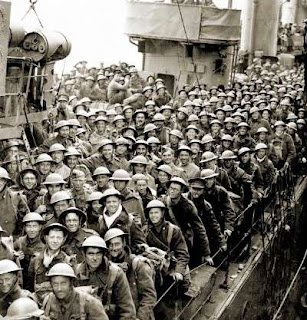
May 1940 was a pivotal point in the history of the world. The German army had swept through northern Europe and the British and French armies were in, what I believe the technical historical term is, ‘deep doo-doo’. The Royal Navy had too few ships available to evacuate the troops stranded on the beaches of Dunkirk. Those ships that were in the vicinity were unable to manoeuvre close enough to the shore to affect a rescue. As the enemy forces lay poised to deliver the final blow an audacious plan was hatched which was to critically alter the course of history.

The plan was called Operation Dynamo. It called on anyone with a small, seaworthy craft to come and help. A flotilla of over eight hundred little ships assembled: fishing boats, pleasure crafts and lifeboats. Some of these craft ferried soldiers from the shore to the bigger ships, some took men directly back to England. They were not designed for war, but in the hands of those who knew them and could handle them, they played a vital part in the battle.
The grave plight of the troops led King George VI to call for an unprecedented week of prayer. Throughout the country, people prayed for a miraculous delivery. The initial objective was to recue 45,000 men in two days. Over the next nine days 338,226 soldiers were rescued by the hastily assembled fleet of little vessels and only 40,000 were left behind, dead or captured. Over two hundred of the ships were sunk and a similar number damaged .

One contemporary account of the evacuation wrote:
"It was the queerest, most nondescript flotilla that ever was, and it was manned by every kind of Englishman, never more than two men, often only one, to each small boat. There were bankers and dentists, taxi drivers and yachtsmen, longshoremen, boys, engineers, fishermen and civil servants. . .
Even before it was fully dark we had picked up the glow of the Dunkirk flames, and now we could see silhouetted the shapes of other ships, of boats coming home already loaded, and of low dark shadows that might be enemy motor torpedo boats. The beach, black with men, illumined by the fires, seemed a perfect target, but no doubt the thick clouds of smoke were a useful screen.”

What we see in the Dunkirk Spirit is a fleet of small vessels, not at all uniform in design or ordered in their command structure. They have a clear sense of vision and they participate at great personal risk because they understand what is going on and what they can contribute. This flotilla works together and collaborates where possible with the Naval Fleet. It is a messy business, slightly chaotic and not that well thought through but it turns the tide of history.
I believe that we live at a point in time where there are millions stranded on the ‘beaches’. We need a new paradigm of mission where there is a new sense of urgency on reaching and rescuing the lost. We need a new strategy to connect with those stranded from the conventional approaches. I believe that what we are beginning to see in New Zealand and around the world is a flotilla of small craft mobilized. More responsive, less uniform, better able to take initiative and get in closer to the shore. This rag tag flotilla can be confusing to those who man the bridges of the big destroyers. It is the navy, but not as they have known it. The difficulty is that many in the Naval Fleet see the Flotilla of small ships as an unnecessary distraction, self absorbed and deflecting resource from their battle plans, whereas many in the Flotilla find the Fleet, inflexible, hierarchical and disconnected from reality. In Operation Dynamo they work together. The key thing to grasp is that the fleet and the flotilla all sail under the ensign of the King.

The St George's Cross flown from the jack staff is known as the Dunkirk jack, and is only flown by civilian ships and boats of all sizes which took part in the Dunkirk rescue operation in 1940. The only other ships permitted to fly this flag at the bow are those with an Admiral of the Fleet on board. The smallest of the flotilla, the 15 ft fishing boat “Tamzine” is on display in the Imperial War Museum in London. Little boats given a status and a place of honour because they served the King.

I believe we need to see ore inter-generational cooperation, I believe we need to see a recognition from the Fleet of their limitations in the current crisis, i believe the Flotilla needs to collaborate more, to put aside personal agendas and to be less cynical about the Fleet. But as I write I see the smoke of battle smudging the horizon, listen to the sound of the guns and am aware of all those we are not reaching. I long to see urgent prayer for the lost becoming a feature of the year ahead and in particular to pray for a new generation of influence and service to be raised up - who sees things... differently.

Above all I want to see more little ships on the high sea joining the rescue flotilla. Crewed by people giving what they have, who are willing to hazard all for the sake of rescuing some. If you would like to talk about how you can partner with us in prayer, finance or service do get in touch with me. If you want to join the adventure of meeting the challenge of this generation in the company of friends - come. You wont find me at the Captain’s table or on the bridge of a flagship, I’m in the battered dinghy that’s leaking a bit but trying to press on through the wash. Join us.

7 comments:
Hi Nigel, I do like your analogy of the flotilla and the fleet. As with all analogies there are places where they fall down and perhaps I am reading too much into it. I think there is a danger in introducing a ‘rescue’ mentality, into your work. The flotilla was there to carry troops back to the safety and security of England, meanwhile leaving French civilians to live under an oppressive and brutal occupying force. It seems that there are times when being rescued to a safe environment is desirable, if you are injured, or if your small dinghy has been run over by the fleet for example. However in general perhaps the terrorist cells of the resistance is a more apt analogy. They live behind enemy lines, among the people who are hurt by brutality and oppression. Like the flotilla they are non-uniform, flexible and responsive, they too have a shared vision that they work towards. They form into networks for support and resourcing, and communicate with those that can provide aid and information. The resistance lives alongside those that most need them, participating in the messy and hard life that occurs in occupied territory, providing the people with the hope of freedom yet to come.
Thanks Christina. I appreciate your insights and comments as always.
As for the rescue mentality. It is one of the things I like about the metaphor.
God is in the rescue business
Psalm 72 v 14
"He will rescue them from oppression and violence, for precious is their blood in his sight."
Psalm 82 v 4
"Rescue the weak and needy; deliver them from the hand of the wicked."
Psalm 142 v 6
"Listen to my cry, for I am in desperate need; rescue me from those who pursue me, for they are too strong for me."
Isaiah 19 v 20
"It will be a sign and witness to the LORD Almighty in the land of Egypt. When they cry out to the LORD because of their oppressors, he will send them a savior and defender, and he will rescue them."
Ezekiel 34 v 12
"As a shepherd looks after his scattered flock when he is with them, so will I look after my sheep. I will rescue them from all the places where they were scattered on a day of clouds and darkness."
Zephaniah 3 v 19
"At that time I will deal with all who oppressed you;
I will rescue the lame and gather those who have been scattered. I will give them praise and honor
in every land where they were put to shame"
Luke 1 v 74
"to rescue us from the hand of our enemies, and to enable us to serve him without fear"
Romans 7 v 24
"What a wretched person I am! Who will rescue me from this body of death?"
Galatians 1 v 4
"who gave himself for our sins to rescue us from the present evil age, according to the will of our God and Father"
Col 1 v 13
"For he has rescued us from the dominion of darkness and brought us into the kingdom of the Son he loves"
1 Thessalonians 1 v 10
"and to wait for his Son from heaven, whom he raised from the dead—Jesus, who rescues us from the coming wrath."
God has rescued his people in the past, promises that he will send a rescuer in the future, has done what is needed to rescue us and WILL rescue us in the future.
I like the idea of the resistance and I think you have heard me speak about the International Underground Conspiracy.
But both the flotilla and the resistance need to be committed to rescue.
Where I think the analogy has limitations is that for all its significance Dunkirk was basically a defeat. The rescued force went on to provide soldiers for North Africa and D-Day but 1940 was still a low point.
But if in the flotilla, the fleet, the invasion force in training or the resistance there needs to be a common commitment to bringing light and life as well as support and resources.
Let me know what you think!
Hi Nigel
Thanks for this stimulating piece. I suspect it has a particular relevance for ourselves over here where there's another 'done Kirk' sort of situation and perhaps another urgent need to 're-group' all over again.
Thanks Jerry
The "done-kirk" comment made me smile but I realise that it is not that funny.
I personally think that the Church of Scotland as it has been is in its death throes anyway. Leaving aside the issue of the ordination of a practicing homosexual - which should never have become personalised in the first place - I find the lack of respect for manifest by the procedural politics and the lack of reverence in parading and applauding sexual sin quite appalling.
Love to you all.
Nigel - really liked the post. I have been thinking a lot recently about the idea of rescue. Mark Stibbe/Andrew Williams have written a book called Breakout telling the story of St Andrew's Church, Chorleywood. The picture of the church as a lifeboat station is central to the whole story - sending people out to rescue those at peril on the sea. However, are we equipped to man the lifeboats? are we prepared to put our lives at risk to man the lifeboats..the blog is excellent really appreciated the post on the 5 year vision
Hi, very interesting post, greetings from Greece!
top [url=http://www.c-online-casino.co.uk/]casino games[/url] check the latest [url=http://www.casinolasvegass.com/]online casinos[/url] autonomous no consign bonus at the leading [url=http://www.baywatchcasino.com/]casino online
[/url].
Post a Comment